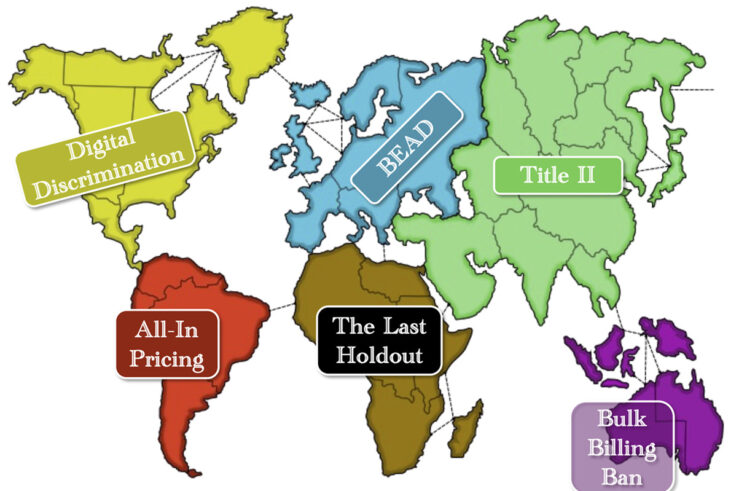The Nanny Brigade has once again descended on the Windy City. It previously sought to protect us from unhealthy trans fats, smoking in private establishments that we voluntarily patronize, and those oh-so-offensive theatrical depictions of smoking. The Nannies are now working to protect Chicago’s well-heeled from risks associated with the locally produced, artisanal sausages sold in some of the city’s finest restaurants. Whatever would we do without these folks (other than enjoy our lives more)?
At the end of November, the Chicago Reader published an article on small, local sausage makers whose products are beloved by foodies but who are not licensed by the government. The charcuteries’ sophisticated patrons realize they’re dealing with unlicensed meat-preparing facilities, but they know the sausage makers, are aware of the high-quality products they use and the care they take in making their products, and are willing to purchase the products despite the absence of a commercial license. Many of the charcuteries would have to shut down if forced to comply with applicable regulations, which were written to govern (and to protect) large-scale industrial operations. As one of the meat-preparers explained:
The regulations are written for industrial food operations. And if you apply them to small-scale local producers, no one’s gonna do it. It’s legislating local food out of the market. Unfortunately, the health departments don’t appreciate that. But that food is actually safer. It’s easier for someone on that small scale to move things more quickly and be more careful. Local markets are self-regulating. If there’s anything wrong with your products and someone gets sick from it, then you’re out of business.
Not surprisingly, the food regulators disagree with this assessment. Last week, regulators from the Illinois Department of Agriculture raided one of the Chicago restaurants that was mentioned in the Reader story (along with its sister restaurant). While the story never said those restaurants bought any of the offending meat products, it did observe that some of the underground meat-preparers obtained their meats from the same processors as the raided restaurants. The state’s compliance officer said that the raid, which unearthed 80 pounds of illicit bacon and some headcheese, was prompted by the Reader story. She warned that the other restaurant mentioned in the story might also be raided.
We’re not talking about dives here. The raided restaurants were celebrity chef Rick Bayless’s Frontera Grill and Topolobampo. Accolades for those restaurants include an International Herald Tribune ranking of Frontera as “the world’s third best casual restaurant,” a Conde Naste Traveler review proclaiming Frontera’s fare “the best Mexican food I’ve had outside Mexico,” and a New York Times declaration that Topolobampo is “the most elegant and serious Mexican restaurant in the country.” The to-be-raided restaurant is North Pond, which landed spots on Travel & Leisure‘s list of the top forty restaurants in America and Epicurious‘s list of the “top ten farm-to-table restaurants.”
Part of the appeal of Frontera, Topolobampo, and North Pond — all favorites of mine — is that they strive to use small-batch, locally produced ingredients. Such ingredients tend to be produced with a bit more tender loving care, they’re generally fresher, they give diners a connection to their own geographic region (a connection that many people really value), they help ensure the persistence of a local agricultural community (which lots of folks like), and their production is at least perceived to be less resource intensive (e.g., it involves lower transportation costs). But the diminutive scale of many small-batch food preparers precludes them from being able to comply with the various food safety regulations that were drafted for large-scale food processors (and tend to insulate those processors from competition).
Now the public health crowd is sure to jump down my throat for suggesting that we permit the risk of food borne illnesses in order to allow diners to enjoy, and local artisans to craft, small-batch meat products. Doesn’t the government have a responsibility to ensure the safety of our food supply? I actually don’t think it does, but I won’t argue that fairly extreme point here. Instead, I’ll make the narrower argument that the government is pursuing its objective in the wrong way.
Imagine if Frontera or Topolobampo served artisanal sausage that made patrons ill. Rick Bayless’s empire would come crashing down in an instant. The local meat-preparer that made the sausage would be immediately out of business. Tort liability would ensue. In short, market pressures and the tort system create extremely strong incentives to avoid significant risks — far stronger than the incentives created by the costly and cumbersome food regulatory machine. (Frontera’s recent raid resulted in the seizure of some bacon; no fines were issued. Big deal.) Moreover, the regulatory machine tends to be both over- and underinclusive in its reach: It sanctions conduct that poses little risk (like home sausage-making by yuppies on Chicago’s North Shore) while giving a pass to real risks that haven’t yet been identified by the centralized regulators (who are somewhat far from the action) and incorporated into a formal rule. Market pressures, on the other hand, nimbly regulate all risks perceived by those closest to the action, while ignoring non-risks.
In light of the strong and focused incentives created by the market and the tort system, how about something shy of an outright ban on meat products that haven’t received the government’s stamp of approval? There are lots of alternatives here. The best, I believe, would be pure laissez faire. In such a world, producers would seek to make their products more attractive to consumers by earning the seal of approval of private certifiers. Competition among those certifiers (i.e., competition to be “most trusted”) would lead them to focus on just the right factors for evaluating food safety — to structure their rules so that they catch all real risks but ignore non-risks. The Jewish community relies on this sort of private certification system for Kosher foods, and it works quite well.
While I’d opt for laissez faire, I realize it’s a political non-starter. So how about a scheme in which the government (e.g., USDA) acts as a safety certifier but doesn’t ban non-certified products? We could structure this as either an opt-in system or an opt-out system. Under the former approach, food sellers who complied with all USDA requirements would have the right to advertise their products as USDA inspected — that is, they could opt into the system. Consumers who want the governmental seal of approval could then seek out only USDA-approved foods. An opt-out system would be a little more paternalistic. Under that approach, producers could sell foods that hadn’t met USDA’s requirements, but only if they opted out of the regime by labeling the products as “Not USDA-Approved.”
The point is, there’s a spectrum of regulatory alternatives here. From least to most restrictive, it proceeds from laissez faire (let markets, aided by private certifiers, do the work), to an opt-in public certification system (let USDA certify for those who care about its approval), to an opt-out public certification system (let those who want to avoid USDA’s requirements do so if they warn consumers), to an outright ban (the status quo). The option our government has selected — the most restrictive, and the most likely to protect an industry group from consumer-friendly competition — threatens to drive local, small-scale food producers out of the market. For example, the charcuterie that was the primary focus of the Chicago Reader article, E&P Meats, voluntarily shut down in response to the regulators’ raid of Frontera Grill. That’s “protection” I, as a locavore and handmade sausage afficionado, can do without.




